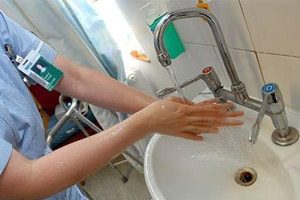
In an effort to stem the tide of infections associated with healthcare, hospitals are encouraging patients to be more assertive about asking doctors and staff if they’ve washed their hands. Hand-washing is a simple and effective way to reduce the spread of infections. The Centers for Disease Control and Prevention (CDC) calculates that infections acquired […]
 In an effort to stem the tide of infections associated with healthcare, hospitals are encouraging patients to be more assertive about asking doctors and staff if they’ve washed their hands. Hand-washing is a simple and effective way to reduce the spread of infections.
In an effort to stem the tide of infections associated with healthcare, hospitals are encouraging patients to be more assertive about asking doctors and staff if they’ve washed their hands. Hand-washing is a simple and effective way to reduce the spread of infections.
The Centers for Disease Control and Prevention (CDC) calculates that infections acquired in hospitals, doctors’ offices, and nursing homes affect about a million patients a year and are linked to nearly 100,000 deaths, the Wall Street Journal reports. Proper hand hygiene can reduce infections and the related problem of drug-resistant bacteria, but studies show that only about half of hospital staff fully comply with hand-washing protocols. Patients are often reluctant to ask staff, especially doctors, about hand-washing, fearing they will seem rude or disrespectful and will damage their relationship with the doctor.
Hospitals are trying to create an atmosphere in which patients feel comfortable asking about hand washing, using posters, bedside placards, and buttons for staff. Admission packets stress the importance of hand washing and the CDC has provided 16,000 copies of a video, “Hand Hygiene Saves Lives,” to be shown to patients at admission. The University of Pittsburgh Medical Center is developing computerized verbal reminders to patients to ask staff to clean their hands when they enter the room, the WSJ reports.
Susan Coffin, a pediatric infectious disease physician at the Children’s Hospital of Philadelphia, says many of these efforts are “insufficient to overcome some of these barriers,” according to the WSJ. She is co-author of a study, published in June in the American Journal of Infection Control, which found that while 84 percent of patients are aware of the infection risk, only 67 percent of patients would remind a health care worker to wash their hands, most often out of embarrassment or concern about appearing rude or undermining authority.


